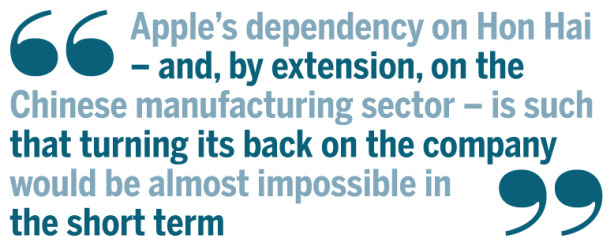Made in China: Tech, Ethics and Economics
September 1, 2010 | 07:28

Hon Hai's relationship with Apple
There is one fatality – which predates the spate of suicides seen in 2010 – that stands out purely for its ties to a particular brand rather than Hon Hai in general. According to several media reports, Sun Danyong jumped to his death on July 16, 2009 while under investigation by Hon Hai over the loss of a prototype unit for the iPhone 4. It was suggested that the company’s security division conducted an illegal search of Sun’s apartment, confined him against his will and then used physical force while questioning him. Hon Hai apologized to Sun’s family, one manager was suspended and police launched a probe into the incident.Apple publishes an annual supplier responsibility report. The 2010 instalment said that workers aged 11-15 were hired at three facilities in countries where the legal minimum age of employment is 16. It also identified cases in which workers were working excessive hours or being paid below the minimum wage.
In addition, the website of Hon Hai’s Hong Kong subsidiary features a copy of an audit conducted by Apple, dated 2006. The audit team interviewed over 100 employees selected at random in the Shenzhen plant, speaking to them about labour standards, working and living environment, compensation, overtime and worker treatment. They also made on-site inspections and reviewed personnel files and payroll data.
The report found that Hon Hai was “in compliance in the majority of the areas audited.” However, it did flag several areas of concern – including the quality of some off-site accommodation, overly complex payment structures, and employees working excessive overtime – and said it was working with Hon Hai to address these issues.

Harney is scornful of Apple’s supplier responsibility report, suggesting that it had “missed the root cause of worker dissatisfaction at Foxconn.” She is similarly downbeat about the multinationals’ approach to supply chain oversight. “There is a huge paper trail to cover companies in the case of labour violations being exposed in the international media. This allows multinational corporations to say ‘we knew about this and we had programs in place to address it’.”
Apple’s credibility may have taken a hit and Hon Hai will for a time be remembered for the alleged labour labour abuses, whether or not such charges are actually warranted. Neither company, though, has incurred substantial commercial damage. Indeed, Apple recently posted its highest ever quarterly earnings, with profit up 78% to US$3.25 billion for the three months to June 26. It sold 3.47 million Macs and 3.27 million iPads during the period.
Given that Hon Hai, like most of its peers, works to a 3% net profit margin, Apple will inevitably have to cover a proportion of the wage hike. But Benjamin Reitzes, a New York-based tech sector analyst with Barclays Capital, believes strong sales of iPads and iPhones will minimize the impact to Apple. Rather it's Dell and HP, both prolific outsourcers, whose profit margins will come under the most pressure from this rise in costs.
Moreover, Apple’s dependency on Hon Hai – and, by extension, on the Chinese manufacturing sector – is such that turning its back on the company would be almost impossible in the short term and commercially imprudent in the medium to long term.
“For now Apple is pretty much tied,” said Steven Tseng, a Taipei-based tech sector analyst with Royal Bank of Scotland. “Apple is looking for secondary sources but it can’t just drop Hon Hai overnight. Even then, Hon Hai has got sizeable capacity and it’s very competitive. If clients wanted to move orders away they would want the new supplier to have the same capacity and cost competitiveness.”
Hon Hai is at least 35% larger than all its EMS competitors combined and its workforce is roughly nine times the size of laptop maker Pegatron Technology’s and five times that of Flextronics, the next largest EMS player. The economies of scale Hon Hai extracts from this size advantage – plus the diversity of its customer base and operations – have allowed it to increase its share of global EMS revenues from around 15% in 2001 to nearly 60% last year, according to CLSA, a brokerage.

MSI MPG Velox 100R Chassis Review
October 14 2021 | 15:04








Want to comment? Please log in.